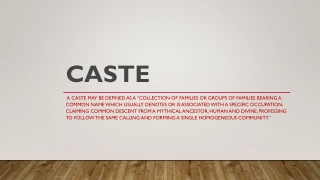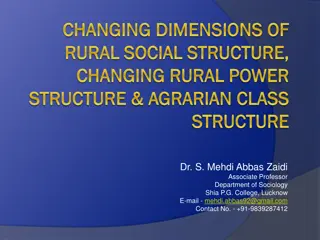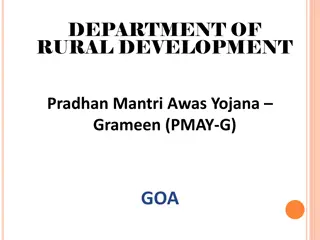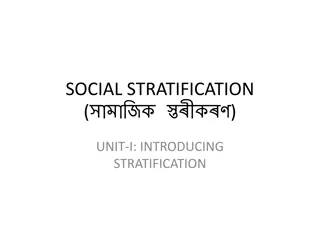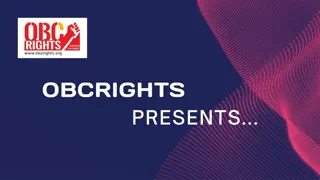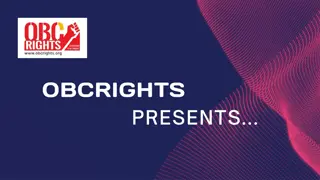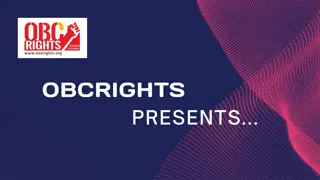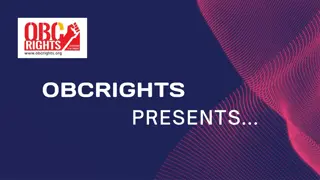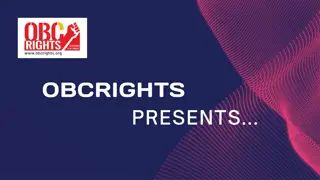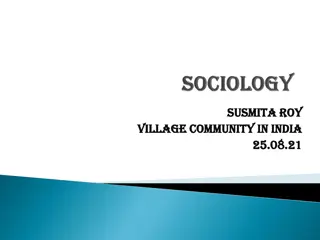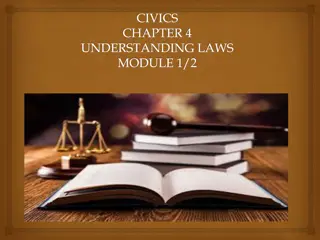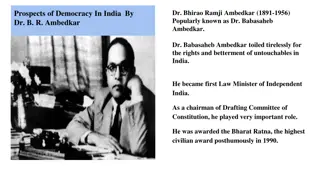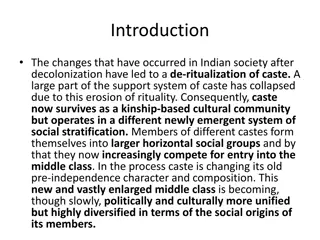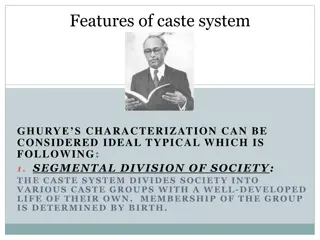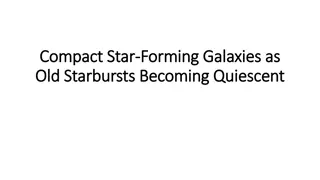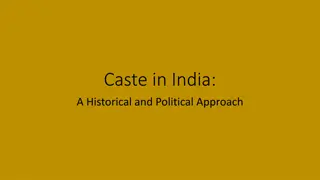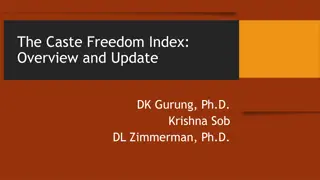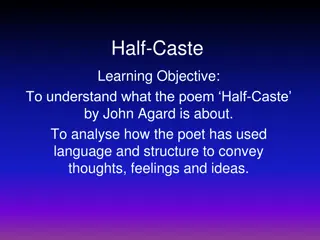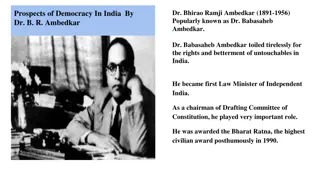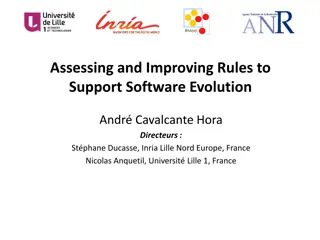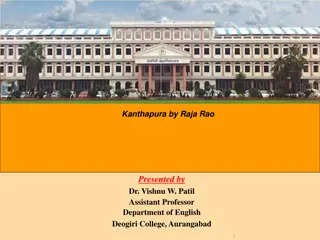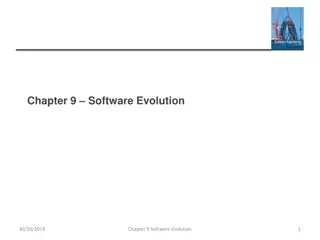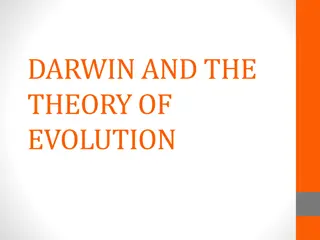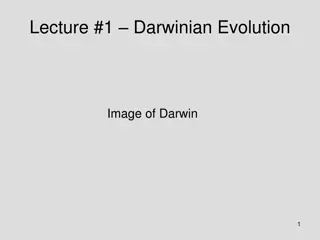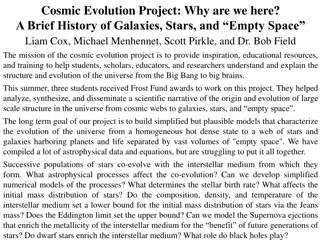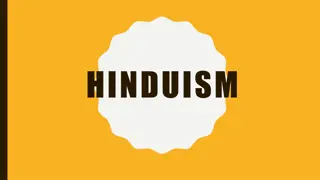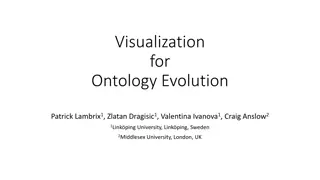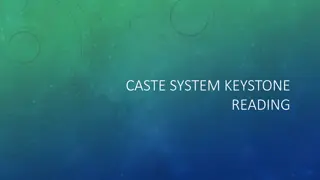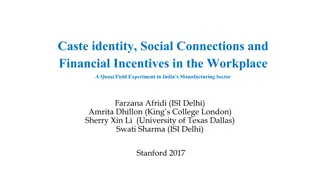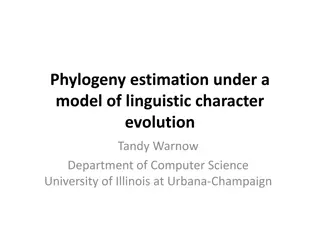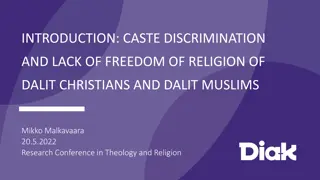Overview of Caste System in India
The caste system in India is a social structure defined by hereditary groups, each with specific occupations, rules, and traditions. Membership is based on birth, leading to a rigid hierarchy and limited mobility between castes. Endogamy, occupation, commensality, and purity are key features that sh
0 views • 17 slides
Understanding Gender Roles in Society
Gender roles in society are socially constructed, with distinctions between gender and sex. Gender influences behavior, responsibilities, and societal expectations. Factors like family, caste, class, religion, culture, media, and laws play a significant role in shaping these roles. It's crucial to c
2 views • 34 slides
Status of Family Laws in India: Hindu vs. Religious Minorities
The family and personal status laws in India vary between Hindu law and those pertaining to religious minorities. While Hindu law has seen extensive reforms, discriminatory provisions still exist. In contrast, laws governing religious minorities have undergone fewer reforms, leading to greater inequ
2 views • 4 slides
Changing Dimensions of Rural Social Structure in India
Rural social institutions in India have deep historical roots, encompassing family, kinship, caste, class, and village structures. This complexity reflects a wide range of social norms, values, roles, and obligations. Changes in the caste system and the practice of jajmani are also highlighted, show
2 views • 21 slides
Pradhan Mantri Awas Yojana Grameen (PMAY-G) in Goa
Pradhan Mantri Awas Yojana Grameen (PMAY-G) is a housing scheme launched in Goa aiming to provide assistance to rural families for constructing houses. Beneficiaries are selected based on the Socio Economic Caste Census 2011. The scheme offers financial aid of Rs. 1,20,000 per house. Challenges face
0 views • 8 slides
Iravati Karve - Renowned Anthropologist and Sociologist
Iravati Karve (1905-1970) was a distinguished anthropologist, sociologist, educationist, and writer known for her work on kinship, Indian culture, and the Mahabharata. Through her major works and analysis of kinship organization in India, Karve made significant contributions to understanding regiona
2 views • 14 slides
SOCIAL STRATIFICATION
Social stratification categorizes individuals based on factors like wealth, education, and power. Caste systems, as seen in India, are closed and ascribed by birth, while class systems are open and based on achievement. This comparison highlights the differences between the two systems and their imp
4 views • 5 slides
A Comparison of Hinduism and Buddhism in Ancient Indian Religions
Hinduism and Buddhism, two major religions originating in ancient India, share beliefs in concepts like moksha and reincarnation but differ in practices, gods, texts, and societal impacts. Hinduism's caste system influences all aspects of life, while Buddhism was founded by Siddhartha Gautama, the B
2 views • 11 slides
Features of Jainism: An Overview Presented by Debajit Hazarika, Assistant Professor
Jainism is an ancient non-Vedic religion with roots tracing back to the times of the Indus Valley Civilization. It emphasizes non-violence, self-conquest, and spiritual liberation through 24 Tirthankaras, with Lord Mahavira being the most significant. Jainism stands out with its rejection of caste d
1 views • 7 slides
How to apply for a Community Certificate in Tamil Nadu
A community certificate is a document serving as proof that an individual belongs to a specific category or caste. The main reserved categories in the country are Scheduled Caste (SC), Scheduled Tribes (ST), and Other Backward Classes (OBC). This certificate can be applied in the E-Sevai portal.\nTo
3 views • 5 slides
DNC cast list popuplation in as per Ambasankar Commission .
Denotified Communities (DNC) refer to social and educationally Backward groups officially recognized and labelled as such by the Government under the Tamilnadu Backward community.DNC population Count as per the Ambasankar Commission report:Note: The Following are the Communities that are in the Cent
4 views • 5 slides
BC Caste population as per Ambasankar Commission in India
In India, the term \u201cBackward Classes\u201c(BC) refers to socially and educationally Backward groups. In India, they come to OBC at the National level.\nBC population Count as per Ambasankar Commission:\nNote: The Following are the Communities that are in the Central Government list of \u201cOBC
6 views • 5 slides
MBC Caste population as per Ambasankar Commission in India.
MBC in the Indian context typically refers to \u201cMost Backward Classes.\u201d This is a category used in some Indian states to identify communities that are considered socially and educationally Backward.\nMBC population Count as per Ambasankar Commission\nNote: The Following are the Communities
3 views • 5 slides
Guidelines for Upholding Rights of LGBTQ
In light of evolving societal norms and the imperative to safeguard the rights and dignity of LGBTQ individuals and inter-faith\/inter-caste couples, the Supreme Court has given guidelines for the handling of habeas corpus petitions and petitions for police protection.\nBackground:\nRecent instance
9 views • 4 slides
How to apply for a Community Certificate in Tamil Nadu
A community certificate is a document serving as proof that an individual belongs to a specific category or caste. The main reserved categories in the country are Scheduled Caste (SC), Scheduled Tribes (ST), and Other Backward Classes (OBC). This certificate can be applied in the E-Sevai portal.\nDo
6 views • 5 slides
how to get Inter caste Marriage Certificate in Tamil Nadu
other spouse is from a Non-Scheduled Caste. This type of marriage often requires special considerations and documentation due to the different social categories of the spouses.\\nDocuments Needed:-\\nTo request an Inter-caste Marriage Certificate in Tamil Nadu, you must provide the following documen
5 views • 5 slides
Socio-Cultural Features of Village Community in India
The traditional village community in India was historically self-sufficient, with its own production and consumption units. Over time, changes have led to increased interactions among villages, diminishing self-sufficiency. Factors like multi-caste populations, markets, pilgrimages, and pilgrimages
3 views • 18 slides
Understanding Laws in India: Equality and Evolution
In independent India, all individuals are equal before the law, with laws applying equally to everyone regardless of religion, caste, or gender. The colonial rule brought arbitrary laws like the Sedition Act of 1870, leading to protests for greater equality. With the emergence of the Indian legal pr
0 views • 7 slides
Challenges of Caste System and Democracy in Indian Society
Dr. B.R. Ambedkar discusses the prospects of democracy in India, highlighting the challenges posed by the caste system. He emphasizes the need for true societal unity and cooperation to achieve democracy beyond a mere form of government. The Caste system's deep-rooted inequality and lack of shared e
0 views • 10 slides
Evolution of Caste in Post-Colonial Indian Society
Changes in Indian society post decolonization have led to the de-ritualization of caste, resulting in a shift towards a kinship-based cultural community operating in a new system of social stratification. Secularization of caste has detached it from ritual hierarchy and aligned it with competitive d
5 views • 10 slides
Features of Caste System: Ghurye's Characterization
The caste system, as characterized by Ghurye, features segmental division of society determined by birth, hierarchy based on purity, restrictions on feeding and social intercourse, civil and religious privileges/disabilities, lack of occupational choice, and severe restrictions on inter-caste marria
2 views • 6 slides
Evolution of Compact Star-Forming Galaxies and Quiescent Galaxies
The evolution of galaxies from compact star-forming to quiescent states involves processes such as secular evolution, gas inflows, and star formation quenching. By studying the structural relations and star formation in these galaxies, insights are gained into their transition towards quiescence. Th
0 views • 12 slides
Understanding Caste in India: A Historical and Political Perspective
Caste in India is a complex system deeply intertwined with religion, history, and society. It is a hierarchical structure that dictates social organization, power dynamics, and economic relationships. The system, comprising varna and jatis, perpetuates inequality and marginalization, with long-stand
0 views • 22 slides
The Scopes Monkey Trial: Clash of Cultures and Evolution Debate
Following World War I, the Scopes Monkey Trial in Tennessee marked a pivotal clash between urban and rural cultures over the teaching of evolution. The trial, prosecuted by William Jennings Bryan and defended by Clarence Darrow, resulted in teacher John Scopes being found guilty of violating the ant
0 views • 9 slides
Understanding the Caste Freedom Index in Nepal
Delve into the Caste Freedom Index in Nepal, highlighting the current status of Dalits and the need for such an index. Learn about the caste system's power and organization in Nepalese society, and why this index is crucial in combating caste-based discrimination. Explore historical perspectives and
0 views • 20 slides
Understanding John Agard's Poem "Half-Caste
Explore the meaning and themes of John Agard's poem "Half-Caste," analyzing how the poet uses language and structure to convey thoughts and feelings. Delve into the origins of the term "half-caste" and its implications, as well as Agard's unique approach to humor and breaking down racial boundaries
0 views • 13 slides
Challenges of Caste System in Indian Democracy
Dr. B.R. Ambedkar highlighted the challenges of democracy in India, emphasizing the deep-rooted caste system. He explained how the caste system leads to inequality, lack of community purpose, and hinders the ideals of a democratic society. The differences between caste and class systems were also ou
0 views • 10 slides
Rules and Practices for Software Evolution Support
This content focuses on the importance of rules and practices to support software evolution, addressing challenges, benefits, and impact on ecosystems. It emphasizes the need for system-specific rules, automatic extraction of conventions, and client support. The evolution of software is highlighted
0 views • 65 slides
Raja Rao's Kanthapura: A Tale of Tradition and Transformation
Raja Rao's novel "Kanthapura" narrates the story of a village in South India through the eyes of an old woman, Achakka. The village is divided by caste, with Brahmins holding privilege. The protagonist, Moorthy, embraces Gandhian ideals and challenges the caste system, facing excommunication. The no
0 views • 19 slides
Software Evolution: Managing Change and Evolution in Organizational Systems
Software evolution is an essential process for organizations to maintain the value of their critical business assets. It involves adapting to new requirements, addressing errors, and enhancing performance. The majority of software budgets in large companies are dedicated to evolving existing systems
0 views • 61 slides
Darwin and the Theory of Evolution: A Comprehensive Overview
Darwin's Theory of Evolution encompasses the concepts of organisms changing over time and life evolving through natural selection. Influenced by scientists such as James Hutton, Jean Baptiste Lamarck, and Alfred Russel Wallace, Darwin's theory culminates in the idea of evolution by natural selection
0 views • 9 slides
Understanding Evolution: Key Concepts and Perspectives
Explore the concepts of Darwinian evolution, evidence for evolution, Darwin's theory, and the Modern Synthesis. Delve into the spiritual versus intellectual perspectives, the diversity of religious affiliations globally, and the compatibility of faith and science in understanding the natural world a
0 views • 91 slides
Unveiling the Cosmic Evolution: A Journey Through Galaxies, Stars, and Empty Space
Delve into the intricate story of the universe's evolution from its hot dense origins to the vast cosmic web of stars and galaxies. Explore questions on stellar birth rates, interstellar medium influences, and the role of dark energy. Follow the journey of three students working on the Cosmic Evolut
0 views • 30 slides
Insights into Hinduism: Traditions, Beliefs, and Society
Hinduism, an ancient religion, developed by the Aryans in India, encompasses a diverse pantheon of gods, beliefs in reincarnation and karma, and a structured caste system. The worship of numerous gods reflects the monotheistic belief in Brahma. Social aspects, such as the caste system, play a signif
0 views • 17 slides
Understanding Evolution: Key Concepts and Perspectives
Explore the key concepts of Darwinian evolution, including evidence for evolution, Darwin's theory, and the Modern Synthesis. Reflect on the relationship between spiritual and intellectual perspectives, emphasizing that different ways of thinking can complement each other. Discover the diversity in
0 views • 91 slides
Visualizing Ontology Evolution for Improved Knowledge Management
Ontologies are dynamic entities that evolve over time, impacting semantically-enabled applications and knowledge acquisition. This work focuses on identifying desired functionalities for ontology evolution systems, highlighting the steps involved in ontology evolution, and emphasizing the importance
0 views • 16 slides
Understanding the Caste System through a Dalit Perspective
Explore the author's purpose in discussing the life of Dalits, the transformation they have undergone, and the challenges they still face within the traditional caste system. Discover insights into the portrayal of Dalits in society, the role of statistics in highlighting their realities, and the on
0 views • 8 slides
Caste Identity and Social Connections in Indian Manufacturing Sector
The study explores the impact of caste identity and social networks on productivity in Indian garment factories. It highlights the persistence of social and economic inequality based on caste, affecting poverty rates and income differentials. The research delves into how caste-based recruitment and
0 views • 31 slides
Evolution of Indo-European Languages through Phylogeny Estimation
Explore the evolution of Indo-European languages through phylogeny estimation under a model of linguistic character evolution. Follow the Computational Historical Linguistics Project's collaboration that began in 1994, leading to the development of methods and studies on homoplasy-free evolution and
0 views • 61 slides
Caste Discrimination and Lack of Religious Freedom Among Dalit Christians and Dalit Muslims
This research conference delves into the issues of caste discrimination and limited freedom of religion faced by Dalit Christians and Dalit Muslims in India. It explores the historical and social context, theological influences, and the significance of counter theology in addressing these systemic i
0 views • 20 slides
